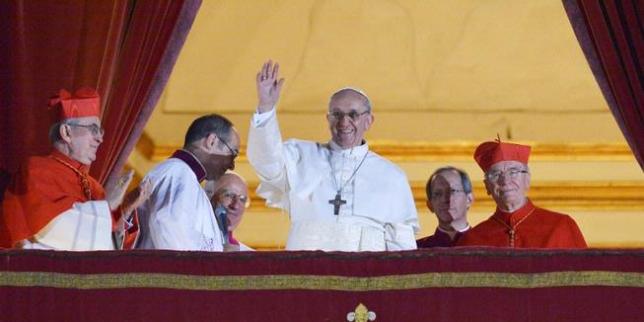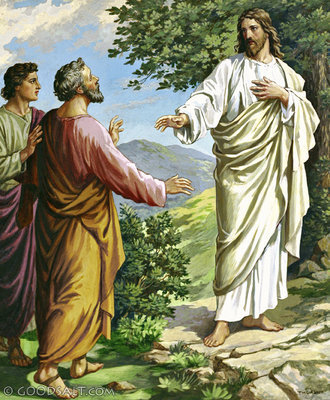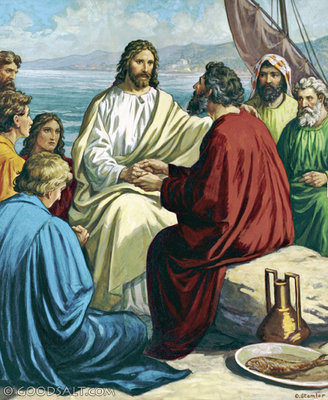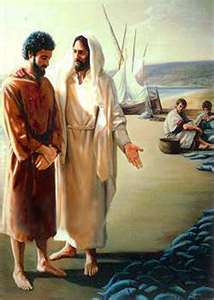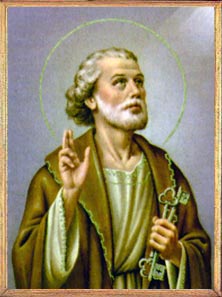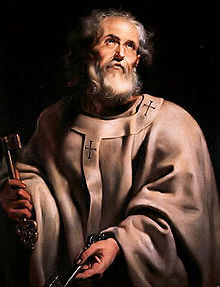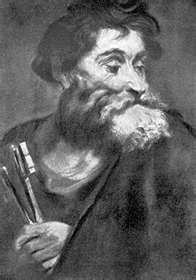PETER AND THE CATHOLIC CHURCH
We, Catholic Christians, believe that Christ built His Church upon Peter by quoting the Gospel of Matthew to justify our stand: “And I tell you, you are Peter, and on this rock I will build My Church, and the powers of death shall not prevail against it. I will give you the keys of the kingdom of heaven, and what you bind on earth shall be bound in heaven, and whatever you loose on earth shall be loosed in heaven” (Matthew 16:18-19 RSV).
Those who do not believe, however, came with some biblical argumentations. (1) Saint Paul wrote to the Corinthians, “For no other foundation can any one lay than that which is laid, which is Jesus Christ” (1Cor 3:11). (2) Filled with the Holy Spirit, Saint Peter boldly said to the Jewish religious leaders: “This (Christ) is the stone which was rejected by you builders, but which has become the head of the corner. And there is salvation in no one else, for there is not other name under heaven given among men by which we must be saved” (Acts 4:11-12). (3) Saint Peter also said, “To you therefore who believe, He is precious, but for those who do not believe, “The very stone which the builders rejected has become the head of the corner,” and “A stone that will make men stumble, a rock that will make them fall ……” (1Peter 2:7-8). Thus, it is very clear that Jesus Christ is the Rock, not Peter or his successors.
Christ is both FOUNDER and FOUNDATION of the Church. Not only do those who accuse us, accuse us falsely, but they distort Scripture to suit their purpose. Catholics do not mean to say that salvation is “built” upon Peter nor the Christ’s Church is founded by Peter. Christ is both the FOUNDER and FOUNDATION of His Church. Without Christ, there is no Church. Christ is not only the Savior of Christians. He is also the Life of Christians.
Christ, however, did found a “visible” Church with the twelve Apostles as leaders and Saint Peter as their chief. In the lives of the Apostles as leaders and Saint Peter often took the lead. When Jesus asked His disciples at Caesarea Philipi, “Who do you say that I am?” (Matthew 16:15), who took the lead to express the belief of the disciples? It was Peter. Let us now read the whole text: “And Jesus answered him, ‘Blessed are you, Simon Bar Jona! For flesh and blood has not revealed this to you, but My Father who is in heaven. And I tell you, you are Peter, and on this rock I will build My Church, and the powers of death shall not prevail against it. I will give you the keys of the kingdom of heaven ……’” (Matthew 16:17-19).
The context before and after the phrase “on this rock,” is Christ’s address to Peter. Grammatically, it is untenable that Christ suddenly in a small phrase without any justification applies this rock to Himself. If it were not a reference to Peter, why should it say, “You are Peter, and on this rock …” Let us now replace “this rock” with “Christ” and see if it makes sense grammatically. “And I tell, you are Peter, and on Christ I will build My Church.” Does this sentence make sense? If Christ were referred to as “this rock”, the first part would have been left out without any loss of meaning. Besides, to whom did Jesus give the Keys of the Kingdom of Heaven? To Peter, of course! It would be absurd of Christ, who held the keys, to say that He would give the Keys to Himself.
The interpretation of this text to prove that Christ did not make Peter the rock upon which He would build His Church not only twists the text in such a way that it makes no sense but it also makes Our Lord Jesus Christ appear foolish. Peter in Greek language is Petros and rock is Petra. It is, in grammar, what we call a pun, a play of words. In the original Aramaic language spoken by Jesus, there is only one word, kepha, for Peter and the rock. It should read like this, “You are the kepha and upon this kepha I will build My Church.” In translating this into Greek, which has genders, it would sound silly to give Peter the word Petra which is feminine. It would be making fun of Peter. So the translator had no choice except to change the gender of the word to the masculine Petros.
Peter’s leadership. Peter’s leadership of the twelve can be easily seen in the New Testament by any unprejudiced reader. His name heads the list of Apostle’s names (Mt 10:2; Mk 3:16; Lk 6:14; Acts 1:13). Of the inner circle of three – Peter, James and John – again Peter comes first (Mk 9:2; Mt 17:1; 26:37). When all the disciples of Christ left Him except the twelve Apostles because Jesus claimed that they must eat His Body and drink His Blood, Jesus asked the twelve, “Will you also go away?” Who answered for all the Apostles? Simon Peter answered, “Lord, to whom shall we go? You have the words of eternal life; and we have believed, and have come to know, that You are the Holy One of God.” (Jn 6: 67-68). After Jesus’ resurrection, the angel at the tomb told the women to go tell His disciples and Peter (Mk 16:7). Mary Magdalene ran up to Peter and told him of the Lord’s resurrection (Jn 20;2). When two of Jesus’ disciples on the road to Emmaus, after recognizing Jesus, returned to report to the eleven Apostles and “those who were with them, who said, “The Lord has risen indeed, and has appeared to Simon!” (Lk 24:34). Why did the Gospel of Luke mention only the name of Simon Peter if it were not that he had a special standing among the disciples? In one of his letters, Saint Paul mentioned that the risen Lord appeared first to Cephas (Peter) and secondly to the other disciples (1Cor 15:5). Why should Paul make this specific reference to Peter if Peter had not a special role?
Peter’s role as rock or leader becomes clearer after Christ’s resurrection. At the lakeside, Jesus asked Peter three times, “Simon, son of John, do you love Me?” And thrice, when Peter confessed his love, Jesus said to him, “Feed My lambs”, “Tend My sheep”, “Feed My sheep” (Jn 21:15-17). This was predicted earlier by Christ, i.e. at the Last Supper, that Peter would deny Him three times before the cock crew, but Jesus prayed for him so that Peter’s faith may not fail: “Simon, Simon, behold, Satan demanded to have you, that he might sift you like wheat, but I have prayed for you that your faith may not fail; and when you have turned again, strengthen your brethren.” … “I tell you, Peter, the cock will not crow this day, until you three times deny that you know Me” (Lk 22:31-32,34). Peter’s leadership was one of “feeding and strengthening” the faith of Christ’s disciples.
Peter did this after the descent of the Holy Spirit. He took the lead in choosing another Apostle in place of Judas (Acts 1:17), in addressing the crowd of people on the day of Pentecost (Acts 2:14), in defending Christ before the Jews and their priests and in condemning Ananias and Sapphira (Acts 5:3-10). He was in held in great reverence by all so that his shadow might fall on them and heal them (Acts 5:15). This was not said of other Apostles. Three years after his conversion Paul went up to Jerusalem to visit Peter and stayed with him for 15 days (Gal 1:18). Again, why Peter and not the others, if it were not that he was the undisputed leader?
Another objection and the response. There were (and still are) people who argue that Peter could not have been the leader of the Church because Paul did rebuke Peter for his inconsistency over the questions of circumcision and because James finally decided the issue.
This objection presupposes that leadership is a kind of tyranny. Why cannot a leader be rebuked for what he has done wrong, especially since Christian leadership is one of service, not of tyranny. Jesus said, “… the Son of Man came not to be served but to serve” (Mt 20:28). Peter’s leadership was one of humble service and that was why he accepted Paul’s rebuke. Christian leadership is always humble obedience to the Truth in service of others: to admit one’s mistakes and correct them for others. No human being is exempted from mistakes. The fact that Peter accepted Paul’s rebuke proved that he was a true leader following Christ’s command.
When the dispute over circumcision grew hot, the Apostles and the elders gathered in Jerusalem to discuss the matter (the first council – Acts 15). …… And after there had been much debate, Peter rose and said to them, “Brethren, you know that in the early days God made choice among you, that by my mouth the Gentiles should hear the word of the Gospel and believe. And God who knows the heart bore witness to them, giving them the Holy Spirit just as He did to us; and He made no distinction between us and them, but cleansed their hearts by faith. Now therefore why do you make trial of God by putting a yoke upon the neck of the disciples which neither our fathers nor we have been able to bear? But we believe that we shall be saved through the grace of the Lord Jesus, just as they will” (Acts 15:7-11). After Peter’s speech “all the assembly kept silence” (Acts 15:12). Only then did the assembly listen willingly to Barnabas and Paul as they related the “signs and wonders” that God worked through them “among the Gentiles” (Acts 15:12). At the end of which, James, drawing the attention of all to what Peter said (Acts 15:14), gave his opinion (see verse 19). He agreed with Peter. It was only after all these that the final judgment was made by “the apostles and the elders” with the whole Church, for it “seemed good” to them (Acts 15:22). They choose men and sent them to Christian Gentiles with a written letter. The letter is important because it tells us who finally decided. It was not James but the “apostles and the elders” in whose name the letter was written, …… “The brethren, both the apostles and the elders, to the brethren who are of the Gentiles in Antioch and Syria and Cilicia, greeting” (Acts 15:23), who finally passed judgment. If any one person’s importance is emphasized, it is that of Peter, because the disciples “kept silence” after Peter’s speech. James only agreed with Peter and drew the attention of the others to Peter’s reasoning.
Peter’s successors. After the death of Saint Peter, his successors took the role of leadership. When conflict disturbed the Church of Corinth in the first century (90 A.D.), the appeal was made to Peter’s successor in Rome, Pope Saint Clement [pontificate: 88-97]. Saint Clement sent a letter of admonition and his correction was accepted by the Christians at Corinth. Why was not Saint John the Apostle called to settle the dispute? He was still alive at Ephesus by that time. In the second century [190 A.D.], the Eastern Churches again requested Pope Saint Victor I [pontificate: 189-199]. Bishop of Rome, to decide on the date of Easter. His decision was final. In the late second century, Saint Irenaeus [130-202], bishop of Lyons, wrote against false teachers saying, “the tradition which that very great, oldest, and well-known Church, founded and established at Rome by those two most glorious apostles Peter and Paul, received from the apostles …… every church must be in harmony with this Church (the Church in Rome) because of its outstanding pre-eminence.” Cyprian of the third century [200-258] referred the question on baptism to Pope Saint Cornelius [pontificate: 251-253] and later to Pope Saint Stephen I [pontificate: 254-257] in Rome. Again their decision was adopted by all. Pope Saint Dionysius [+ 268] demanded from the Patriarch of Alexandria an explanation of certain articles of faith to which Alexandria complied. Cyprian, the martyr-bishop of Carthage wrote in the year 250,
“It is on him (Peter) that He (Jesus) builds the Church, and to him that He entrusts the sheep to feed. And although He assigned power to all the apostles, yet He founded a single chair, thus establishing by His own authority the source and hallmark of the churches’ oneness. No doubt the others were all that Peter was, but a primacy is given to Peter and it is thus made clear that there is but one Church and one chair …… If a man does not hold fast to this oneness of Peter, does he imagine that he still holds the faith? If he deserts the chair of Peter upon which the Church was built, has he still confidence that he is in the Church?”
In the fourth century, Saint Athanasius [296-373] appealed to Pope Julius I [pontificate: 337-353] against the unjust decision of some Oriental bishops. Pope Julius reversed the decision. All in the same century, Saint Jerome [347-420], the first great biblical scholar, wrote to Pope Saint Damasus I [pontificate: 366-384], “I follow no one as leader except Christ alone, and therefore I want to remain in union in the Church with you, that is, with the chair of Peter. I know that on this rock the Church is founded.” Archbishop of Caesarea, Saint Basil [330-379], asked Pope Damasus for protection against his enemies. In the fifth century, saint Chrysostom [344-407], Patriarch of Constantinople appealed to Pope Innocent I [pontificate: 401-417] to resolve grievances caused by Empress Eudoxia and some Eastern Bishops. In the controversy over the so called “Nestorian heresy”, both Saint Cyril [+ 444; bishop of Alexandria from 412] and Nestorius himself appealed to Pope Saint Celestine [pontificate: 422-432]. The following pope, Saint Pope Leo I the Great condemned Nestorius and his doctrine. The Patriarchs, Archbishops and bishops accepted Pope Leo’s decision saying, “Peter has spoken through Leo.” From the time of the Apostles till at least the 9th century, Saint Peter and his successors were recognized as leaders of the Christians. We quoted only a few example of the recognition of primacy of the church in Rome in the early Church after the Apostles.
The bishop of Rome was and is a symbol and agent of unity in faith and love of all Christians. To deny the existence of a leader is not only to be blind to the leading role of Peter in the New Testament and to history but also to deny the necessary fact of human groupings.
References:
(1) Raymond E. Brown, Karl P. Donfried, John Reumann (Editors), PETER IN THE NEW TESTAMENT, New York, N.Y.: Paulist Press, 1973;
(2) Matthew Bunson, OUR SUNDAY VISITOR’S ENCYCLOPEDIA OF CATHOLIC HISTORY, Hungtington, Indiana: Our Sunday Visitor Publishing Division, 1995.
(3) Stanley L. Jaki, THE KEYS OF THE KINGDOM, Chicago, Illinois: THE FRANCISCAN HERALD PRESS, 1986;
(4) Fr. Valentine Long OFM, UPON THIS ROCK, Chicago, Illinois: THE FRANCISCAN HERALD PRESS, 1982;
(5) Fr. Paul Tan Chee Ing SJ, STRAIGHT TO CATHOLICS, Kuala Lumpur, Malaysia: Catholic Research Centre, 1984.

